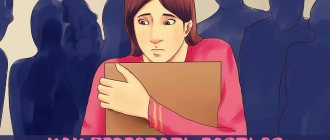“I can’t rely on anyone, so I do everything myself.” “I hate working for other people—that’s why I own my own business.” “Being part of the crowd is not for me.” Do these statements resonate with you? What character is behind them?
Vivian is not exactly the kind of person who can be described as “intimidated.” In fact, most of the time she appears to be quite fearless, making her own rules and living her life as she pleases. She is outspoken, confident and brave. She is always ready for adventure, loves to travel and cannot stay in one place for long.
Vivian works remotely in the information technology industry as an independent contractor. She really likes this format of work, because it allows her to carry out several projects at the same time. When a woman tried to work on the staff of one company for more than a year, everything did not go so well.
The thing is that Vivian is quite skeptical of most people. She admits that she has difficulty trusting others. She trusts only a few people in her life enough to consider them true friends.
However, Vivian is always upset when her colleagues go out for drinks after work or make plans for the weekend and she is not invited. The woman pretends that she doesn't care, but in reality she is very worried about it.
Tried to act like she didn't care
Vivian grew up the middle of three sisters and always felt like the black sheep of the family. Her two sisters were athletic and popular, adored by everyone, including her parents, while Vivian always felt like she didn't belong in their circle. She was more interested in the theater club, computers and art events, and all this was alien to Vivian’s family.
Although Vivian knew that her family cared about her, she never felt fully loved or accepted by them. Vivian always tried to act like she didn't care when in reality she was in a lot of pain.
In high school, Vivian gained a reputation as a black sheep. She figured that if people considered her a rebel, then she would be able to live up to her reputation. Vivian broke many boundaries and rules and came across as someone who was constantly in trouble for one reason or another.
After high school, she decided to travel for a year before going to college, and even now, years later, the woman realizes that it was one of the best decisions she ever made. For the first time in her life, she did not live in the shadow of her sisters.
Now that the sisters are older and have their own families, Vivian gets along well with them. Given her respectable job and impressive income, Vivian is no longer considered a troublemaker, but she still feels like she doesn't fit in with the family and therefore still doesn't let her sisters get too close.
Vivian is an Outcast.
So let's figure out what trust is
Confidence
in sociology and psychology - open,
positive relationships between people (or between a person and a subject), containing confidence in the decency and goodwill of another person (subject), with whom the trustor is in one or another relationship.
The main and first sign of trust is the presence of such a fact in a relationship as fidelity. The trust can be financial or personal in nature. Financial trust can be expressed in the lending of funds or the assignment of authority to manage property. A sign of personal trust is frankness and willingness to share intimate, secret information.
It's about people.
But about society, the topic of trust is well studied by Francis Fukuyama in the book “Trust: Social Virtues and the Path to Prosperity.”
Fukuyama took individual economic, political and social models of real countries, with different levels of trust (USA, UK, France, Germany, Japan, North Korea, Russia, China and others) and examined their management models, the “line” of the government, the role of intra-family relations and education, open religious organizations and closed sects and other things.
All these aspects are woven into a single system based on numbers and logic, and with the help of this system, the author described the importance of trust in the post-industrial era.
So, Fukuyama’s trust plays two roles .
Firstly, as a belief in the decency, benevolence of another person, or in critical situations as a belief in belonging to the same community (nation), requiring from them one or another degree of solidarity.
Secondly, trust is understood as a willingness to follow the rules of the game (institutions) accepted in society, for example, to repay debts on time, fulfill official duties, and follow customs accepted in the family and community.
These two roles are related, but not proportional to each other - different levels of requirements and resistance to following rules in different societies. And according to these levels, Fukuyama divided societies into warm and cold.
Cold societies are those where people have agreed on the rules of the game (agreed on laws, customs, traditions) and no longer need to establish specific personal relationships to resolve standard situations.
Warm societies are those where people, on the contrary, have not been able to agree on common rules and are forced to compensate for the simultaneous existence of different rules with personal relationships (including those of a corrupt nature) or temporary “draconian” rules and a virtual mystical connection between everyone and the leader.
The formal economic criterion for identifying warm societies is the value of the Gini coefficient ≥ 0.4–0.5. If you look at this indicator, then warm cultures primarily include the countries of the post-Soviet space, including Ukraine, as well as Latin America. And in 2021, even the United States is on this list.
A warm social message in practice means that my life experience is also connected to the powerful broadcast of my egregor - previous generations of women and men, deceived, betrayed and unable to come to an agreement in the light of the tragic events of the last 100 years. This is expressed, for example, in a fear of relationships that is inexplicable from a logical point of view or distrust of government initiatives, which are sometimes correct and necessary.
A good example here could be the attitude of society towards the actions of the UK government regarding quarantine measures - all people did what the government suggested, stayed at home, wore masks, did not gather in large groups. At the same time, in Ukraine, like our Belarusian neighbors, all the government’s promises were perceived as deception, and this mistrust cost many people their health, and possibly their lives.
People can't be trusted
The Outcast archetype is the quintessential rugged individualist. Such a person struggles most with the fear of rejection, or the fear of trusting other people. This fear is expressed in the attitude of “reject others before they reject you.”
Deep down, representatives of this archetype believe that people cannot be trusted, and they find confirmation of this in everything. Even if a person has neglected him out of absent-mindedness, the Outcast will be very sensitive to this, draw a conclusion, will not change his opinion and will reject the person forever.
Believing themselves unworthy of love and recognition, Outcasts are often desperate to “prove” something to the world, be it notable achievements, financial success, high social status, or extreme behavior.
Taken to extremes, the Outcast is sometimes capable of self-destructive or criminal behavior because people with this type of fear tend to see the world as conspiring against them and do not feel obligated to discern the undertones, and are also selfish and narcissistic.
It is difficult for outcasts to work in a team, it is difficult to ask for help and assistance. Sometimes these people lack tact and want to do things their own way, without the interference of others. Outcasts prefer to work independently.
Outcasts are the fourth most common fear archetype. In 15% of people it manifests itself as the main one, and in another 38% this archetype is in the top three.
Demeanor
When a person stands straight, does not slouch, but also does not behave too strictly or tensely, it is comfortable to communicate with him. An even, natural, slightly relaxed posture relieves tension between interlocutors and allows people to communicate more freely and openly.
Often, shy people tend to squeeze in during a conversation and take up as little space as possible, take a defensive position or hide their hands in their pockets. This is a big mistake, you cannot do this - such behavior makes you wary.
Interesting fact: people are more willing to trust those who are somehow similar to them. This applies to both appearance and behavior.
For example, if a person stands with his right leg slightly forward when talking, then he will be more trusting of someone who takes a similar pose. Psychologists explain this by saying that a person subconsciously notes similar habits and mistakes the interlocutor for “one of his own.”
Positive qualities of an Outcast
Outcasts tend to be mobile, motivated, and determined to succeed in a particular endeavor. Even if a reward is not expected, they will be happy to express themselves in this way. Outcasts are often successful. Where most people would have given up long ago or given up hope of making a difference, the Outcast is persistent and willing to take risks.
The Outcast may not always be a great team player, but he is capable of being an excellent leader. An outcast, in principle, is not afraid of mistakes, uses any opportunities and knows how to take responsibility.
The Outcast is an individualist, he thinks critically and often has extraordinary opinions. These people tend to be attracted to careers that allow them to think outside the box, recognize their individual achievements, and promote recognition. They prefer to do everything on their own, to lead, rather than follow other people's instructions.
How does an Outcast behave?
- The outcast tends to believe that people will always suppress him;
- often afraid to let people get too close;
- prefers to “go deeper” into a conversation rather than laugh it off;
- expresses his opinion without fear of appearing stupid or boastful;
- often feels that he does not fit into society, does not fully belong to it;
- may be sensitive to any rejection, real or imagined, and often becomes overly or unreasonably resentful of someone who changes plans or does not include the Outcast;
- sometimes such a person lacks tact or empathy;
- An outcast can be selfish and narcissistic, everything should be the way he wants;
- it is difficult for him to cooperate with other people and conduct joint projects;
- is not afraid to take risks and try something new.
But here everything is simple. Or not?
1. Are they people? 2. If yes, they cannot be trusted.
Read also: Population as a unit of Evolution
Honestly, dogs shouldn't either. One looked me very intently in the eyes and at the same time tried to steal food from my plate. He thought that if he looked into my eyes, I wouldn't notice what he was doing.
So how to live in this cruel world, who to trust? Do not forget that this is not the expert opinion of psychologists, but the answers of ordinary people, each of whom has their own life experience. People are different, and this is subjective. How do you determine whether a person is trustworthy or not?
How to learn to trust people more
If you are an Outcast, here are some strategies you can use to overcome your fear of rejection.
Rethink. Much of your fear comes from the script in your head. In this case, it is the belief that people cannot be trusted and it is better to reject others before they reject you.
If you want to overcome this fear, you must reformulate your attitude, create a new scenario in your head with different statements that you can repeat to yourself daily. Gradually, the new installation will replace the old one.
For example, if deep down you believe that people cannot be trusted, start telling yourself, “Just because someone has hurt me in the past does not mean that all people are untrustworthy. There are a lot of people in my life that I can trust.”
If you are afraid that people will reject you or let you down, you can reframe this scenario by telling yourself, “Just because someone tells me that they disagree with my opinion does not mean that they are rejecting me as a person.”
Take action. In addition to rewriting the script that is currently playing out in your head, you also need to take some steps to trust and cooperate with other people in real life situations. This will help you confirm and reinforce your new beliefs.
Try to be more proactive in situations that you usually shy away from. For example, if you usually prefer to go it alone and seem to get by on your own, then ask for help or join a group of people. If your trust issues are severe, then it is better to go to a specialist to explore the possible roots of your fear.
Create accountability. As an Outcast, you don't want to allow yourself to be vulnerable. That's why it's so important to actively try to open up about yourself—even if only to one or two trusted people with whom you share responsibility.
Most likely, you will feel completely unnatural at first. Regardless, seeking accountability and honest feedback is critical to overcoming fear. Your accountability partner will help you identify times when your inner Outcast is putting up a defense and will provide support in overcoming your fear of rejection.
You need to trust your partner as much as possible and let him guide you. Since you are not accustomed to seeking help from others, this type of trust may be especially difficult for your archetype.
Advertising
Look for the root of the problem in childhood
Why don't you trust people? You need to remember all the attitudes of your parents who forbade you to trust others. For example, mothers often tell their children not to trust adult strangers, as they may deceive. Also, your parents may have told you to avoid classmates who are not well behaved. The attitudes of relatives could also concern a person’s self-esteem. For example, your parents may have told you that to do something well, you need to do it yourself. As a result, the child grows up with the firm conviction: “I don’t trust anyone.” Such words often scroll through a person’s head, thereby preventing him from existing normally. You should realize all the attitudes that your parents have instilled in you that prevent you from trusting people. When you do this, you should write each of them down on a piece of paper one by one and translate the negative sentences into positive interpretations. For example, the phrase “I don’t trust anyone or anything” needs to be rewritten - “I trust this world and am always open to new proposals.” Read statements like these every day and force yourself to believe them, we also recommend reading about the roots of this problem in this article: https:///article/381599/chelovek-kotoryiy-ne-verit-lyudyam-s-chem-svyazano-ego -nedoverie.











